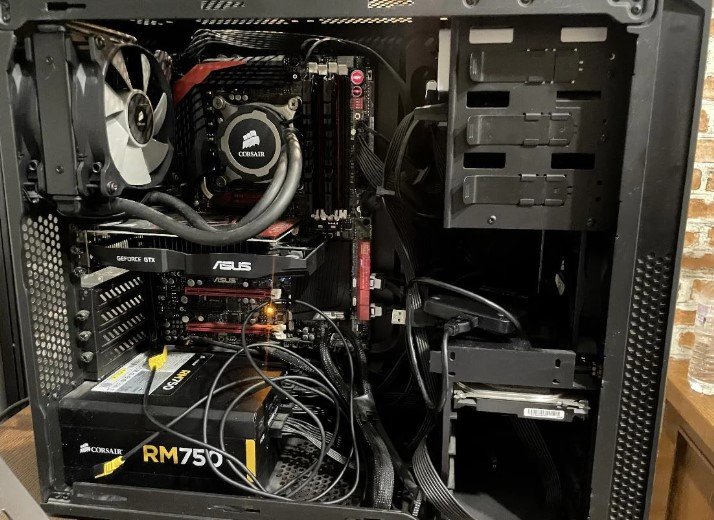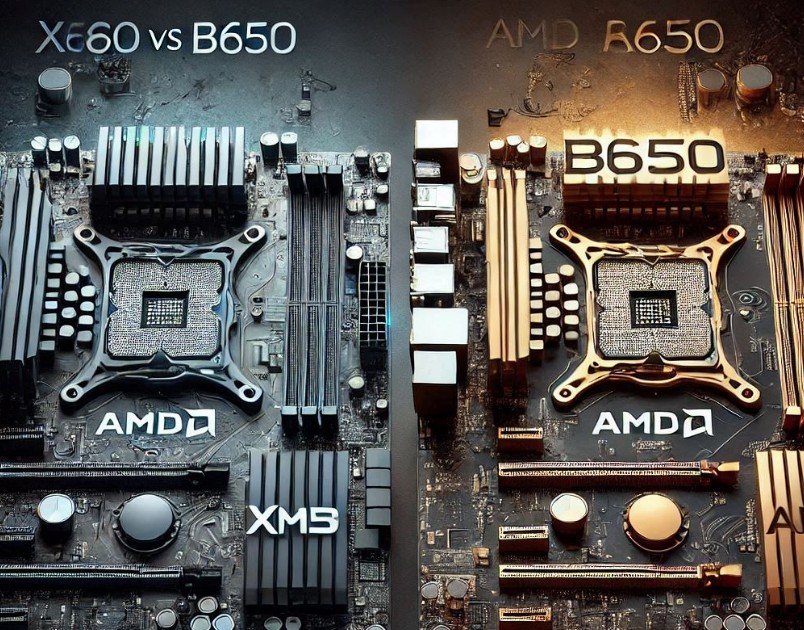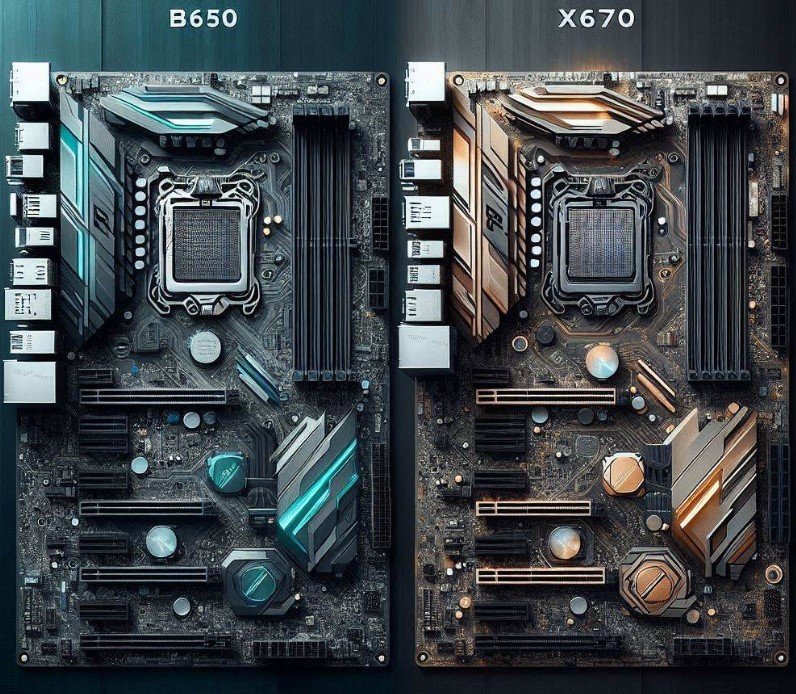In this article, I’ll provide a detailed comparison of the B650 Vs B750 Motherboards to help you decide which one is the best choice for your next build. Choosing an appropriate motherboard for a high-performance machine is of utmost importance when asked to assemble one that meets the specifications. There are two widely used choices in the market, B650 and B750 motherboards with a purpose to address different needs of PC gamers and PC enthusiasts. AMD’s latest processors can use either of the two chipsets but are different in features, performance, and cost.
B650 Vs B750 Motherboards
The B650 and B750 motherboards are targeted at various user scenarios, there are some essential distinctions in performance, connectivity, and price.

The B650 is a good option for medium-end systems, providing good performance, and also enough power delivery components to meet the requirements of most CPUs, such as support for the PCIe 4.0. It is cheap and easy to use for individual or work users without high power capabilities. In contrast, the B750 motherboard is intended for top-of-the-line systems, featuring the highest quality ready-to-use VRMs for most potential overclocking, PCIe 5,0, and a more significant number of USB-C ports and M.2 occupies.
Although the B750 is more costly, it is future-proof technology and it is providing better performance, so it remains the obvious choice for enthusiasts and serious players. At the end of the day the B650 and the B750 are fairly reasonable for the budget user and, respectively, the high-end user, and, for the high-end user, the B750 is more convincing.
Should I Upgrade to B650 now or wait for the B750?
The choice between upgrading to a B650 motherboard right now or waiting for a B750 is largely a matter of user needs and future needs. The B650, provides very compelling value, enabling use with the latest AMD Ryzen 7000-series CPUs, and includes functionality such as PCIe 5.0, DDR5 memory, and high-speed connectivity features. It’s the best choice for users who need a sturdy, powerful out-of-the-box solution without second-guessing the next patch.
On the other hand, B750, upon its launch, is supposed to feature improved capabilities, like better power delivery, more optimized overclocking, and maybe even more PCIe lanes, and would be of greater relevance for folks looking for the latest and greatest or setting up a harder-to-handle system.
B650 Or B750 For A 12400F Build: Which One To Choose?
The choice between upgrading to a B650 motherboard right now or waiting for a B750 is largely a matter of user needs and future needs.

The B650, by way of example, provides very compelling value, enabling use with the latest AMD Ryzen 7000-series CPUs, and includes functionality such as PCIe 5.0, DDR5 memory, and high-speed connectivity features. It’s the best choice for users who need a sturdy, powerful out-of-the-box solution without second-guessing the next patch.
On the other hand, B750, upon its launch, is supposed to feature improved capabilities, like better power delivery, more optimized overclocking, and maybe even more PCIe lanes, and would be of greater relevance for folks looking for the latest and greatest or setting up a harder-to-handle system. Nevertheless, having to rely on this waiting for the B750 might lead to a longer delay and more expensive models afterward.
B650 Vs X670: Which One Should I Choose?
To find the right balance between price and performance, the B650 motherboard is the perfect choice for almost everyone. The B650 is a more budget-friendly option best suited for medium-end systems and people who need stable performance, but for less money, therefore. It provides weak PCIe 5.0 support – mainly for storage and fewer high-speed USB ports – and is thus a good choice for gamers and general consumers who do not need cutting-edge functionality.
In contrast, the X670 is tailored to pursuit and professionals who need high-performance features, a broad range of support for PCIe 5.0 storage and GPUs, and expanded networking interfaces. It also offers increased overclocking potential, multi-GPU configuration, and improved VRM cooling, making it a very ideal option for top-tier builds and future-proof.
X670 Vs B650: Which AMD AM5 Chipset Is Right for You?
If you’re gaming on a high-end PC looking for high-end features, including 100% PCIe 5.0 speed support, 1-step overclocking, and future-proofing the tech you’re using, the X670 is the way to go. But if you’re tight on cash and want good performance in games or around the house without bells and whistles, you’ll want the B650.

What Is The Difference Between B650 And X670 Motherboards?
The most significant difference between B650 and X670 motherboards is in terms of functionality and their target group. Your choice depends on your budget and performance needs. The B650 is a budget GPU that supports PCIe 5.0 in the back-end, but with fewer USB ports, fewer features for overclocking, and other cost reductions, that are suitable for mid-range systems.

In contrast, the X670 is a platform-based professional platform, designed for top-notch systems with full PCIe 5.0 support for graphic cards and hard disk drives, high overclocking potentialities, various connectivity options, and multi-GPU support which appeals to enthusiasts and professionals.
AMD X670E Vs X670 Vs B650E Vs B650: Which Is Better?
When comparing both, the X670E is top-of-the-line, providing full PCIe 5.0 support for GPUs and storage, high-end overclocking, and extreme I/O capabilities, all of which help it best suit enthusiasts and high-performance builds. The X670 is a cutback, but PCIe 5.0 is supported only by storage and optional GPUs, so it is guaranteed impressive performance for power users.
The B650E provides PCIe 5.0 I/O for both the GPUs and storage at a competitive price point, targeted at budget users and power users. Finally, the B650 is the cheapest with a standalone PCIe 5.0 storage card, which is good enough for mid-range builds and hobbyists. The best choice will be based on both budget and the use of features you wish to emphasize.
Are All B650 Motherboards The Same?
No, not all B650 motherboards are the same. Although they use the same chipset, variants have some different attributes, including VRM design, connectivity, presence/availability of PCIe 5.0, presence/availability of USB ports, as well as overclocking and build quality.

For instance, certain B650 motherboards support premium options such as Wi-Fi, high-end cooling, and audio, targeting various budgets and performance requirements. Make sure to verify the particular model specification to confirm that it satisfies your needs.
Do B650 Motherboards Support DDR5?
Yes, B650 motherboards do support DDR5 memory. However, depending on the model, some B650 boards also feature DDR4, amongst other components. It is necessary to confirm the specification of the motherboard to confirm whether DDR5 memory is supported, as it will deliver higher performance and more future-proof memory technology.
Which AM5 Boards To Get Or Avoid?
Before deciding which AM5 motherboards to purchase or avoid, first one should think about his/her requirements, budget, and the capabilities offered by the board. For instance, good-quality products made by well-known brands such as ASUS, MSI, and Gigabyte are typically considered to excel not only in build quality but also in performance and extensive BIOS implementation.
Game stations and hardcore overclockers will find premium chipset boards such as the X670E or B650E competitively priced and well-supported, as they are typically better equipped with high-performance VRM cooling, PCIe 5.0, and premium connectivity including USB 4. For example, make sure to check processor support, maximum memory operating frequency supported, and user reviews, to name just a few.
Conclusion
To conclude, comparing B650 Vs B750 Motherboards the B650 motherboard is a good choice for a competitive, budget-oriented medium-end platform if one is in search of a high-performance, budget-level solution with all the necessities in terms of, for example, PCIe 4.0. But, if you’re a geek or require high-level performance with ahead-of-the-curve technologies such as PCIe 5.0, improved power routing, and advanced overclocking then the B750 remains the optimal option. The choice has to be made on performance requirements and price, and the B650 is better suited for basic users while the B750 is better for demanding users.
People Also Ask
Will B650 support next gen?
Yes, B650 motherboards will fully support next-gen AMD Ryzen 7000 series processors such as those shipped on the AM5 socket. Although the B650 provides good performance, it might be limited in its features (e.g. related to PCIe 5.0 and overclocking) when compared to higher-end products (e.g. the B750 or X670).
Is My motherboard AM5 compatible?
To know whether your motherboard is AM5 compatible, you have to verify whether it possesses an AM5 slot. The socket AM5 is designed once and only for AMD’s Ryzen 7000 series processors. If your motherboard has an AM5 socket, it will be supported in the following CPUs. In particular, make sure that your motherboard has all the features the ones you need, e.g., DDR5 RAM and PCIe 5.0, according to the model.
Is the ASUS B650 a good motherboard?
The ASUS B650 motherboard is a good option for those users who want performance without breaking the bank. It is compatible with AMD Ryzen 7000 series CPUs and provides the bare essentials, such as PCIe 4.0 and DDR5 support. Although it is not as feature-rich as top-shelf boards, it is a good choice for budget users who need good performance in gameplay or other computing scenarios.
What is the max RAM speed for B650 motherboard?
In terms of DDR5 memory, B650 motherboards are capable of DDR5 memory speeds [typically 4800 MHz up to 6400 MHz, even higher in specific motherboard models and overclocking capabilities]. Nevertheless, the maximum speed can be different, so it is important to verify the specifications for the specific B650 motherboard you want to use to check which type of RAM is compatible.
Can I put 3200mhz RAM in 2400mhz motherboard?
Yes, you can install 3200MHz RAM in a motherboard supporting 2400MHz but the RAM will be set to the motherboard’s maximum supported rate which is here, 2400MHz. The higher-speed RAM will go to clock speed as allowed by the motherboard frequency so even if it will work you will not get the complete performance advantage of 3200MHz RAM if the motherboard doesn’t support higher-speed operation.
